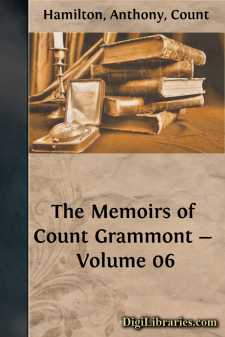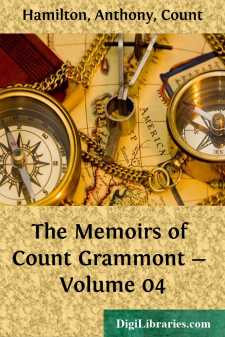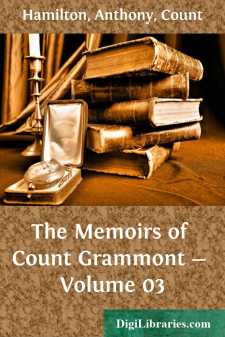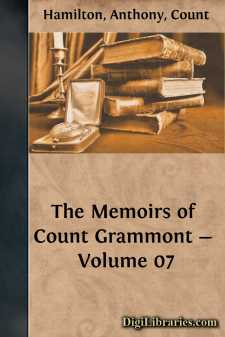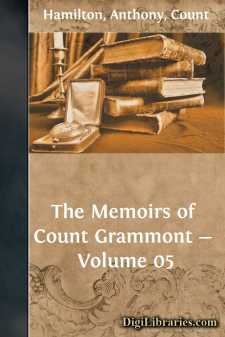Categories
- Antiques & Collectibles 13
- Architecture 36
- Art 48
- Bibles 22
- Biography & Autobiography 813
- Body, Mind & Spirit 138
- Business & Economics 28
- Children's Books 12
- Children's Fiction 9
- Computers 4
- Cooking 94
- Crafts & Hobbies 4
- Drama 346
- Education 46
- Family & Relationships 57
- Fiction 11821
- Games 19
- Gardening 17
- Health & Fitness 34
- History 1377
- House & Home 1
- Humor 147
- Juvenile Fiction 1873
- Juvenile Nonfiction 202
- Language Arts & Disciplines 88
- Law 16
- Literary Collections 686
- Literary Criticism 179
- Mathematics 13
- Medical 41
- Music 40
- Nature 179
- Non-Classifiable 1768
- Performing Arts 7
- Periodicals 1453
- Philosophy 64
- Photography 2
- Poetry 896
- Political Science 203
- Psychology 42
- Reference 154
- Religion 505
- Science 126
- Self-Help 81
- Social Science 81
- Sports & Recreation 34
- Study Aids 3
- Technology & Engineering 59
- Transportation 23
- Travel 463
- True Crime 29
The Memoirs of Count Grammont - Volume 01
by: Anthony Hamilton
Description:
Excerpt
The accounts prefixed to the different editions of his works, down to the year 1805, are very imperfect; in that year a new, and, in general, far better edition than any of the preceding ones, was published in Paris, to which a sketch of his life was also added; but it contains rather just criticisms on his works, than any very novel or satisfactory anecdote concerning himself. It is not pretended here to gratify literary curiosity as fully as it ought to be, with regard to this singular and very ingenious man; some effort, however, may be made to communicate a few more particulars relative to him, than the public has hitherto, perhaps, been acquainted with.
Anthony Hamilton was of the noble family of that name: Sir George Hamilton, his father, was a younger son of James, Earl of Abercorn, a native of Scotland. His mother was daughter of Lord Thurles, and sister to James, the first Duke of Ormond; his family and connections therefore, on the maternal side, were entirely Irish. He was, as well as his brothers and sisters, born in Ireland, it is generally said, about the year 1646; but there is some reason to imagine that it was three or four years earlier. The place of his birth, according to the best family accounts, was Roscrea, in the county of Tipperary, the usual residence of his father when not engaged by military or public business.
[In September, 1646, Owen O'Neale took Roscrea, and, as Carte says, "put man, woman, and child to the sword, except Sir George Hamilton's lady, sister to the Marquis of Ormond, and some few gentlewomen whom he kept prisoners." No family suffered more in those disastrous times than the house of Ormond. Lady Hamilton died in August, 1680, as appears from an interesting and affecting letter of her brother, the Duke of Ormond, dated Carrick, August 25th. He had lost his noble son, Lord Ossory, not three weeks before.]
It has been always said, that the family migrated to France when Anthony was an infant; but this is not the fact: "Sir George Hamilton," says Carte, "would have accompanied his brother-in-law, the Marquis of Ormond, to France, in December, 1650: but, as he was receiver-general in Ireland, he stayed to pass his accounts, which he did to the satisfaction of all parties, notwithstanding much clamour had been raised against him." When that business was settled, he, in the spring of 1651, took Lady Hamilton and all his family to France, and resided with Lord and Lady Ormond, near Caen, in Normandy,
[Hence possibly Voltaire's mistake in stating that Hamilton was born at Caen, in his Catalogue des Ecrivains du Siecle de Louis XIV.]
in great poverty and distress, till the Marchioness of Ormond, a lady whose mind was as exalted as her birth, went over to England, and, after much solicitation obtained two thousand pounds a-year from her own and, her husband's different estates in Ireland. This favour was granted her by Cromwell, who always professed the greatest respect for her. The Marchioness resided in Ireland, with the younger part of her family, from 1655 till after the Restoration; while the Marquis of Ormond continued for a considerable part of that period with his two sisters, Lady Clancarty and Lady Hamilton, at the Feuillatines, in the Faubourg St. Jacques, in Paris.
It appears from a letter of the Marquis to Sir Robert Southwell, that, although he himself was educated in the Protestant religion, not only his father and mother, but all his brothers and sisters, were bred, and always continued, Roman Catholics. Sir George Hamilton also, according to Carte,
[That historian states that the king (Charles I.) deprived several papists of their military commissions, and, among others, Sir George Hamilton, who, notwithstanding, served him with loyalty and unvarying fidelity.]
was a Roman Catholic; Anthony, therefore, was bred in the religion of his family, and conscientiously adhered to it through life....




